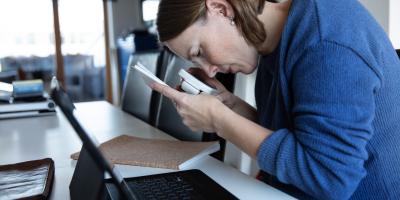
Rachel Olivero: Breaking Barriers in Digital Experience

If you’re reading this blog, you probably don’t consider how difficult or impossible it is for others to do the same thing. You wouldn’t be alone in that, either. Of the top one million sites on the web, 98% of their homepages have Web Content Accessibility Guidelines 2 (WCAG 2) failures, such as overlooking alternative text for non-text content or featuring videos with no captions.
That needs to change.
Across the world, more than 1 billion people live with disabilities and a vast majority of them are — no surprise here — Internet users. And, since the Americans with Disabilities Act (ADA) is about the full inclusion of disabled people in all aspects of public and private life, the web is a vast piece of “all aspects” that’s been deeply neglected.
Enter Rachel Olivero (1982–2019), a technologist who was also a blind, transgender woman. She said, “Accessibility is still a sidebar when it comes to web development” — a clear understatement that, among other elements in the realms of accessibility, inclusion, and diversity, became her calling.
Let’s explore her legacy in the worlds of accessibility, technology, and beyond.
Olivero and Drupal
Rachel and Drupal were destined to be a pair. As an open source project, accessibility is deep in Drupal’s DNA, starting with its own accessibility initiative beginning in 2009. Throughout the years, the Drupal community has continuously sought to make the software more accessible.
Still, sometimes a spark like Rachel can take things from good to much better. From here, lasting friendships and learning exchanges came to be.
Working at the National Federation of the Blind (NFB) as the director of organizational technology from DrupalCon 2017 onward, she became and remained a popular voice in the Drupal community. Through several DrupalCons and her general involvement across the Drupal community, her ideas consistently aligned with the Drupal ethos, making the community more accessible for everyone along the way.
As did her adventurous side, with Deque CEO Preety Kumar remembering her thus:
“Rachel Olivero was really an adventurous spirit. I remember a NFB conference several years ago when Rachel mused, ‘I've always wanted to ride a mechanical bull — y'know, do as Texans do in Texas.’ After fighting the management of the establishment, who were not inclined to let her ride, she got to ride — for a full 30 seconds:-) . . . Rachel is an inspiration to all those who strive to be true to themselves and the cause of digital equality.”
That’s one of many fond memories from her life and exploits across the technology and accessibility world. Her presence on the Drupal Slack channel was prolific as she graciously and thoughtfully answered user questions about accessibility, technology, and life. Forever fighting for the oft-forgotten, she managed to use her influence and savvy to help make Drupal WCAG compliant and supportive of Authoring Tool Accessibility Guidelines (ATAG) 2.0.
To further honor her legacy, the recent Drupal 10 release moved from the Bartik front-end theme to a more modern, accessibility- and simplicity-oriented front-end theme aptly named Olivero.
Simple, modern, focused, and flexible were the key tenets of the Olivero design team, and all their design work was underpinned by Rachel’s mission to make technology accessible to all. In choosing to name the theme after her, the designers strove to move beyond the accessibility-first mantra and plan for future development to embody Rachel’s own driving principles of patience, generosity, and inclusivity.
A legacy of accessibility
Rachel passed away in 2019, but she’s certainly not forgotten and has left a legacy that has her fingerprints on accessibility, diversity, and inclusion throughout the internet. Her life solidified the notion that web accessibility isn’t merely a good feature to have, but an essential component of a properly functioning digital world. She impressed that principle upon the Drupal community and all who came into contact with her.
To this day, in support of her extensive work with the National Federation of the Blind, her family requests any donations be made to the organization at https://nfb.org/donate.


